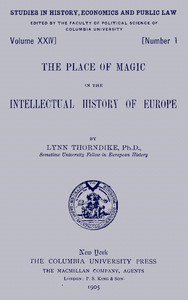| Author |
Thorndike, Lynn, 1882-1965 |
| LoC No. |
06004648
|
| Title |
The place of magic in the intellectual history of Europe
|
| Original Publication |
United States: Columbia university press,1905.
|
| Series Title |
Studies in history, economics and public law edited by the faculty of political science of Columbia University; v. 24, no. 1
|
| Note |
Reading ease score: 60.5 (8th & 9th grade). Neither easy nor difficult to read.
|
| Credits |
Richard Tonsing and the Online Distributed Proofreading Team at https://www.pgdp.net (This file was produced from images generously made available by The Internet Archive)
|
| Summary |
"The Place of Magic in the Intellectual History of Europe" by Lynn Thorndike is a scholarly publication written in the early 20th century. This extensive work delves into the historical beliefs in magic, including witchcraft, astrology, and the relationship between magic and the early scientific thought of Europe. Thorndike examines how these beliefs were not merely relegated to the uneducated but were often accepted by learned and educated individuals across different historical periods. At the start of the text, the author highlights the prevalence of magical beliefs from the medieval period to early modern times, emphasizing that even educated figures believed in astrology and witchcraft. Thorndike introduces various historical figures, including Dante and Aquinas, who incorporated magical elements into their writings, portrayals, and theories. The opening discusses the general acceptance of magical beliefs among educated men, setting the stage for a more in-depth exploration of specific beliefs and their connections to the evolving landscape of science and philosophy throughout European history. (This is an automatically generated summary.)
|
| Language |
English |
| LoC Class |
BF: Philosophy, Psychology, Religion: Psychology, Philosophy, Psychoanalysis
|
| Subject |
Magic -- Europe -- History
|
| Category |
Text |
| EBook-No. |
69622 |
| Release Date |
Dec 23, 2022 |
| Copyright Status |
Public domain in the USA. |
| Downloads |
126 downloads in the last 30 days. |
|
Project Gutenberg eBooks are always free!
|

